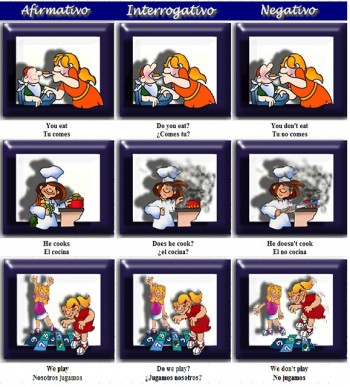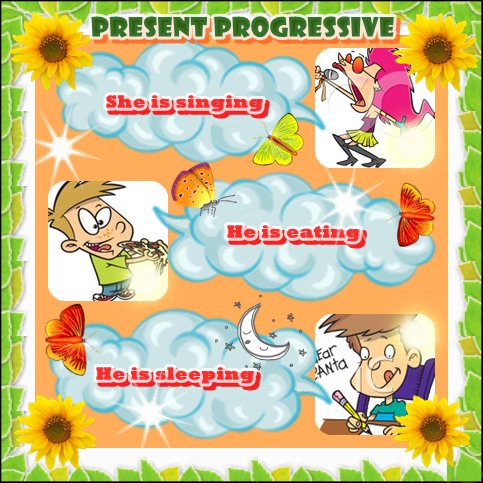SIMPLE PRESENT

Affirmative Sentences
Estructura Sujeto + verbo principal.
Ejemplos:
PlayI talk. (Yo hablo.)
PlayHe eats. (Él come.)
PlayThey learn. (Ellos aprenden.)
Negative Sentences
Estructura Sujeto + verbo auxiliar ("to do") + auxiliar negativo ("not") + verbo principal.
Ejemplos:
PlayI do not [don't] talk. (Yo no hablo.)
PlayHe does not [doesn't] eat. (Él no come.)
PlayThey do not [don't] learn. (Ellos no aprenden.)
Interrogative Sentences
Estructura Verbo auxiliar ("to do") + sujeto + verbo principal?
Ejemplos:
PlayDo you talk? (¿Hablas tú?)
PlayDoes he eat? (¿Come él?)
PlayDo they learn? (¿Aprenden ellos?)
PRESENT PERFECT

FORM
[has/have + past participle]
Examples:
-
You have seen that movie many times.
-
Have you seen that movie many times?
-
You have not seen that movie many times.
We use the Present Perfect to say that an action happened at an
unspecified time before now. The exact time is not important.
You CANNOT use the Present Perfect with specific time expressions
such as: yesterday, one year ago, last week, when I was a child, when
I lived in Japan, at that moment, that day, one day, etc. We CAN use
the Present Perfect with unspecific expressions such as: ever, never,
once, many times, several times, before, so far, already, yet, etc.
PRESENT PROGRESSIVE

El Present Progressive o Continuous se utiliza en inglés para
hablar de situaciones en curso, que han empezado pero aun
no han llegado a su fin: It’s raining (Está lloviendo). Esta forma
verbal se utiliza a menudo para describir situaciones que tenemos
delante de nuestros ojos o que sabemos que se están desarollando
mientras hablamos. Por lo tanto, muy amenudo el Present
Progressive está acompañado por adverbios o expresiones adverbiales
como now, at the moment, at present, currently etc.
Forma afirmativa
El Present Progressive o Continuous es una forma verbal
compuesta por el auxiliar TO BE, conjugado en función del
sujeto de la frase, y por la la forma de participio presente del
verbo principal (V+ing).
I am reading the newspaper.
He is having a shower.
We are playing tennis.
Forma interrogativa
Dado que el Present Progressive contiene el verbo
TO BE como auxiliar, la forma interrogativa se obtiene
invirtiendo el órden del auxiliar y del sujeto:
Are you reading the newspaper?
Is he having a shower?
Are they playing tennins?
